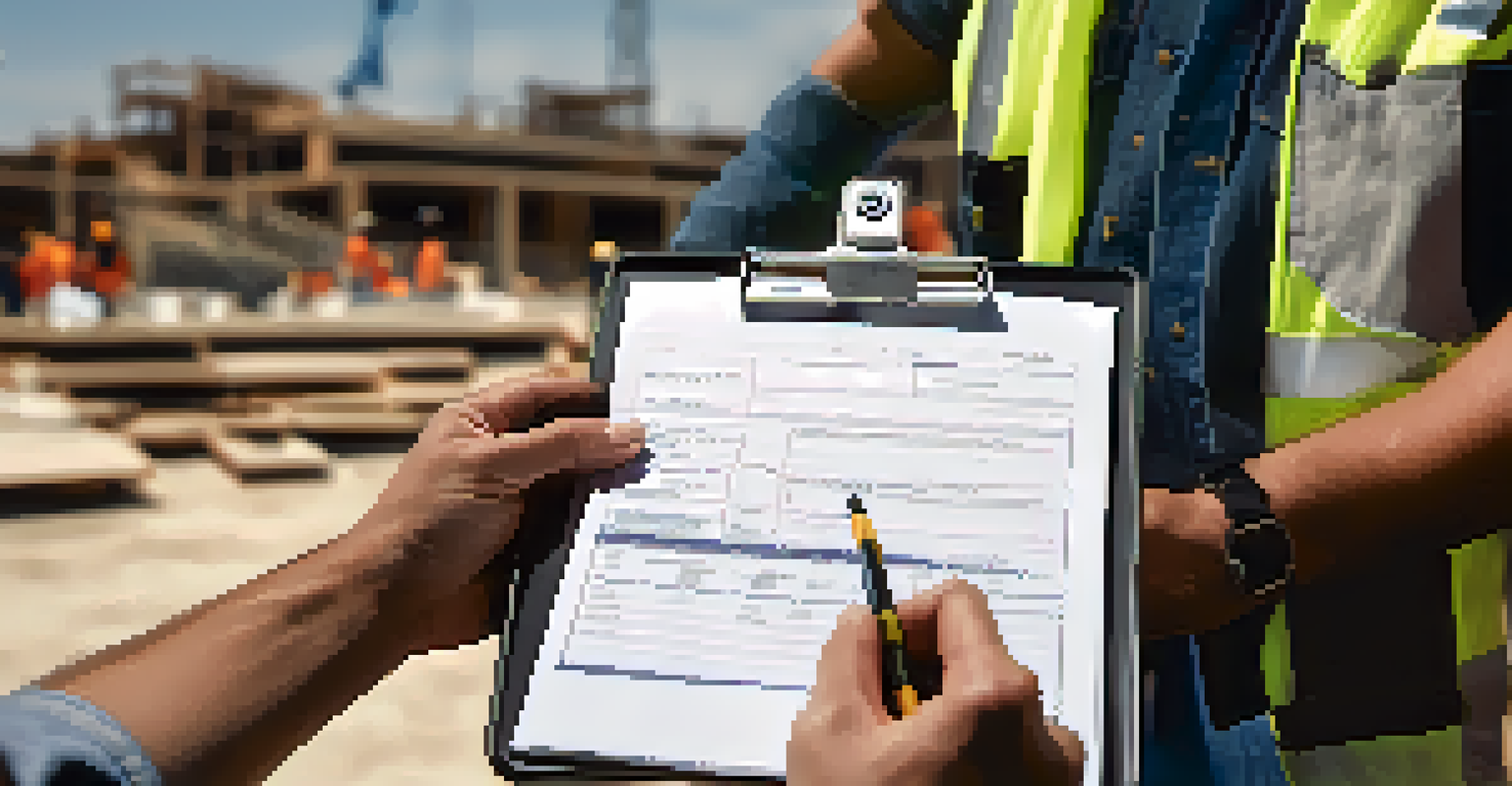How to Ensure Compliance with Building Codes by Contractors

Understanding the Importance of Building Codes
Building codes are essential regulations that ensure safety and quality in construction projects. They establish minimum standards for design, construction, and occupancy of buildings. By adhering to these codes, contractors help protect the health and safety of the public, which should be a top priority in any construction endeavor.
Good building codes are like rules of the road; they guide us toward a safer, more efficient outcome.
Moreover, compliance with building codes can prevent costly legal issues and fines that may arise from non-compliance. When contractors understand and respect these regulations, they not only enhance the quality of their work but also build trust with clients and stakeholders. This trust can lead to repeat business and referrals, which are invaluable in the construction industry.
In essence, building codes act as a framework that guides contractors through the complexities of construction. Familiarizing themselves with these codes allows contractors to navigate potential pitfalls and deliver projects that meet or exceed expectations.
Staying Updated on Local Building Regulations
Building codes can vary significantly from one location to another, making it crucial for contractors to stay informed about local regulations. This means regularly reviewing updates from local building authorities or industry associations to ensure they are aware of any changes. Ignoring these updates could lead to non-compliance, putting both the contractor and the project at risk.

One effective way to stay updated is to subscribe to newsletters or alerts from local building departments. Additionally, participating in local contractor associations can provide valuable insights into the latest building regulations and best practices. Networking with other professionals can also foster a culture of compliance by sharing experiences and knowledge.
Building Codes Ensure Safety
Adhering to building codes protects public health and safety while enhancing project quality.
Ultimately, being proactive about understanding local building codes not only helps contractors avoid penalties but also positions them as knowledgeable professionals in the eyes of clients. This proactive approach can significantly enhance their reputation in the community.
Implementing Comprehensive Training Programs
A well-trained team is one of the most effective ways to ensure compliance with building codes. Contractors should invest in comprehensive training programs that cover relevant building regulations, safety standards, and best practices. By equipping team members with the necessary knowledge, contractors can minimize the risk of errors that could lead to code violations.
An ounce of prevention is worth a pound of cure.
Training should not be a one-time event but rather an ongoing process. Regular workshops, seminars, and refresher courses can help keep everyone updated on the latest changes in building codes and construction techniques. Engaging employees in discussions about compliance can also foster a culture of accountability throughout the organization.
Furthermore, providing training can enhance overall project efficiency. When team members are well-versed in compliance requirements, they can complete tasks more effectively, leading to smoother project execution and ultimately better outcomes for clients.
Conducting Regular Inspections and Audits
Regular inspections and audits are vital to ensuring ongoing compliance with building codes. Contractors should implement a systematic process for reviewing work at various project stages, checking for adherence to safety standards and local regulations. This proactive approach not only catches potential issues early but also reinforces the importance of compliance among team members.
During these inspections, it’s important to document findings and address any issues promptly. Keeping detailed records can also serve as evidence of compliance should any disputes arise with clients or regulatory bodies. Additionally, utilizing technology such as inspection software can streamline this process, making it easier to track compliance over time.
Stay Updated on Local Regulations
Regularly reviewing local building regulations helps contractors avoid non-compliance and fosters a professional reputation.
Incorporating regular audits into project management practices can lead to continuous improvement. By analyzing past projects, contractors can identify recurring issues and implement strategies to avoid them in future endeavors.
Utilizing Technology for Compliance Monitoring
In today’s digital age, technology plays a crucial role in ensuring compliance with building codes. Contractors can leverage various software solutions designed specifically for construction management to streamline compliance monitoring. These tools can help track project progress, manage documentation, and ensure that all aspects of the project meet regulatory requirements.
For example, Building Information Modeling (BIM) can provide visual representations of projects, making it easier to identify potential compliance issues before they arise. Additionally, mobile applications can allow field teams to report on compliance in real-time, ensuring that any discrepancies are addressed immediately.
By embracing technology, contractors can significantly reduce the risk of non-compliance. The integration of these tools not only enhances efficiency but also fosters a culture of accountability and transparency within the team.
Collaborating with Experienced Professionals
Collaboration is key when it comes to ensuring compliance with building codes. Contractors should consider partnering with experienced professionals, such as architects, engineers, and code consultants, who can provide valuable insights and guidance throughout the project. Their expertise can help navigate complex regulations and identify potential compliance issues early on.
Creating a collaborative environment encourages open communication among all parties involved in the project. Regular meetings to discuss compliance-related concerns can help keep everyone aligned and focused on achieving the same goals. This teamwork can significantly enhance the overall quality of the project.
Foster a Culture of Compliance
Creating a culture of compliance within the organization encourages accountability and improves overall project outcomes.
Furthermore, leveraging the expertise of seasoned professionals can instill confidence in clients. Knowing that a team is well-versed in compliance matters can reassure clients that their projects are in safe hands, leading to stronger client relationships.
Documenting Compliance Efforts Thoroughly
Thorough documentation of compliance efforts is essential for contractors. Keeping detailed records of all inspections, training sessions, and communications related to building codes can serve as a valuable resource in the event of an audit or dispute. Proper documentation not only demonstrates a commitment to compliance but also provides a clear trail of accountability.
In addition to tracking compliance activities, contractors should also document any changes made to the project in response to code requirements. This could include modifications to designs, materials used, or construction methods. Such records can be invaluable in showcasing due diligence and adherence to regulations.

Ultimately, comprehensive documentation practices can protect contractors legally and enhance their professional reputation. By demonstrating a commitment to transparency and compliance, contractors can position themselves as reliable partners in the construction industry.
Fostering a Culture of Compliance Within the Organization
Creating a culture of compliance within the organization is crucial for long-term success. Contractors should prioritize compliance as a core value and encourage team members to take ownership of their roles in ensuring adherence to building codes. This can be achieved through regular communication about the importance of compliance and recognizing team members who exemplify best practices.
Encouraging open dialogue about compliance-related challenges can also foster a supportive environment. When team members feel comfortable discussing issues or asking questions, it can lead to proactive solutions and a stronger commitment to compliance. Leadership should lead by example, demonstrating their dedication to upholding building codes in every project.
By embedding compliance into the company culture, contractors can create a shared responsibility for maintaining high standards. This unity can ultimately enhance project outcomes and reinforce the organization's reputation as a leader in the construction industry.